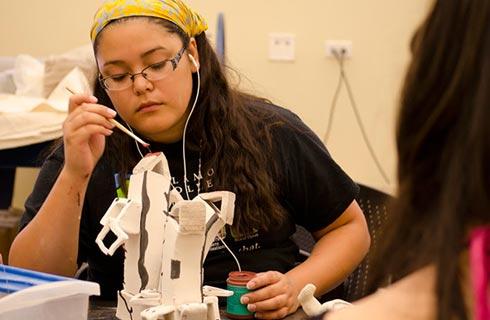课程简介
La Trobe's Bachelor of Biological Sciences gives you a strong scientific grounding plus the flexibility to specialise in an area that interests you. Start with the basics. Build foundational skills in biology, chemistry, ecology and biodiversity, and explore the impacts of infection, epidemics and pandemics. This degree is all about getting your hands dirty. You'll start practical classes from your first year – both in our on-campus labs and facilities, and out in the field. Get a glimpse into your professional future in science with industry-led workshops and seminars, as well as opportunities for work placements. Customise your course with a major of your choice. Select from a range of areas, including biochemistry, botany, ecology, genetics, human physiological sciences, microbiology or zoology. This degree also gives you the option to take a double major or choose an additional minor.<br><br>We depend on the environment for food, fresh air and water, recreation, inspiration and wellbeing, but every day we see how humans are altering and affecting the environment. If you want to contribute to a more sustainable future, a major in ecology gives you the skills and knowledge to make a difference on some of the ‘big issues’ facing humanity. Ecology examines the factors that drive the distribution and abundance of organisms in the environment. It provides a knowledge base for understanding how the environment ‘works’, for appreciating the complexity and diversity of the species and communities which share our environment, and for how we can better manage land and water for a more sustainable future. Ecology offers opportunities to contribute to global environmental issues – such as climate change, protecting threatened species, enhancing urban design, and more sustainable use of forests, water and farmland. Throughout this major, you’ll discover the diversity of plants and animals in Australia and their extraordinary adaptations to Australian environments, make your own observations on plants and animals and the complex relationships between species, learn about current and emerging threats to flora and fauna and ways to protect and manage threatened species, learn to ‘read’ landscapes, and understand how human land uses, climate and disturbance processes shape the environment. Build valuable skills in collecting, reading and evaluating data, communicating scientific concepts, making judgements about environmental issues, identifying plants and animal species, observing animal behaviour, and evaluating human impacts on landscapes. Working with your peers, you’ll also learn to design investigations. This major includes opportunities to do field work, experience different ecosystems, and directly observe real-world issues and environmental management. You’ll graduate with valuable skills and knowledge of how the natural environment ‘works’, the factors that influence the distribution and conservation of species and communities, and an appreciation for how we can better manage landscapes in the 21st century. This will equip you for a wide range of roles in natural resource management, including working with people and community groups, hands-on management of land and water, developing policy and plans, and undertaking surveys and investigations, and solving environmental problems.
展开




































